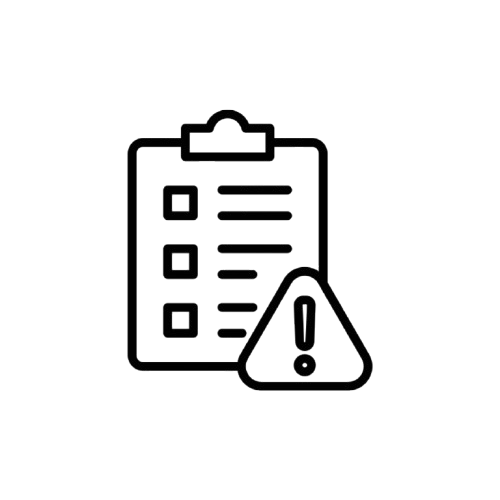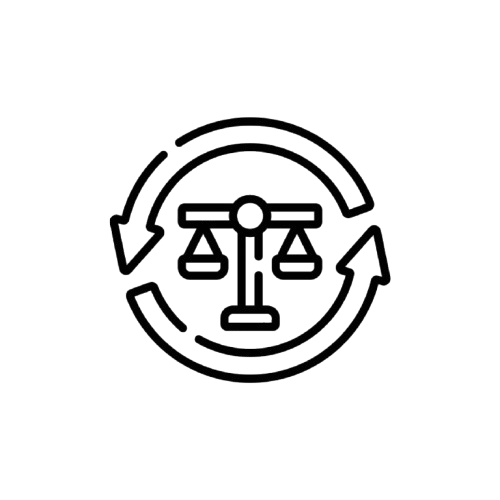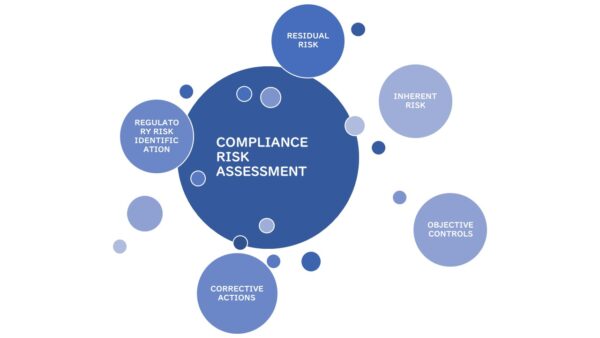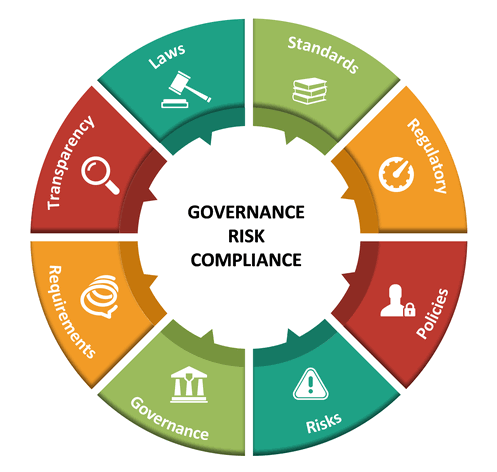Regulatory Compliance Audit and Management in India
- Thorough reviews to ensure Adherence to regulations.
- Stay current with ever-changing laws and standards.
- Proactively address potential compliance risks.
- Comprehensive reports for clear insight and accountability.
- Customized solutions for your specific industry needs
- Rapid response to compliance challenges and discrepancies.
- Continuous oversight to maintain compliance and avoid penalties.
- Streamline processes to align with regulatory requirements.
Key Services in Regulatory compliance Audit and Management in India
Compliance Risk Assessment
Identifies potential regulatory risks within an organization by evaluating current practices and policies, helping to proactively address and mitigate compliance issues before they escalate.

Regulatory Reporting and Filing
Manages the preparation and submission of required regulatory reports and filings, ensuring accuracy and timely compliance with industry standards and government regulations.

Internal Controls Evaluation
Assesses the effectiveness of internal controls designed to ensure regulatory compliance, identifying weaknesses and recommending improvements to enhance operational integrity and mitigate risks.

Regulatory Change Management
Monitors and analyzes changes in regulations, providing guidance on adapting policies and procedures to maintain compliance and avoid potential legal or financial penalties.



What Regulatory Compliance services are provided in India?
Regulatory compliance refers to the adherence to laws, regulations, guidelines, and specifications relevant to an organization’s business processes. Compliance can be mandatory or voluntary, depending on the jurisdiction and industry.


Regulatory Applicability Consultation
- In-depth analysis of your business operations and industry landscape
- Identification of relevant laws, regulations, and standards applicable to your organization
- Tailored guidance on the specific compliance requirements you need to address
Compliance Risk Assessment
- A thorough audit of your current practices and procedures
- Evaluation of potential financial, legal, and reputational risks due to non-compliance
- Actionable recommendations to mitigate identified risks and address compliance gaps




Governance, Risk, and Compliance (GRC) Consulting
- A comprehensive review of your existing GRC program and framework
- Expert guidance on streamlining governance processes and enhancing risk management strategies
- Development of robust compliance programs aligned with industry best practices
Importance of Regulatory compliance Audit and Management in India
Regulatory compliance audit and management are crucial for businesses and organizations for several reasons:
Mitigates Legal Risks:
Regular compliance audits help identify and address potential legal and regulatory issues before they become significant problems. This proactive approach reduces the risk of fines, sanctions, or legal actions, ensuring that the organization operates within the legal framework.
Protects Reputation:
Maintaining compliance enhances an organization’s reputation by demonstrating a commitment to ethical practices and adherence to regulations. A strong compliance record helps build trust with clients, investors, and stakeholders, and can positively influence public perception.
Ensures Operational Efficiency:
Compliance audits often reveal inefficiencies or gaps in processes. By addressing these issues, organizations can streamline operations, improve resource management, and enhance overall efficiency, leading to cost savings and better performance.
Facilitates Business Continuity:
Effective compliance management helps organizations avoid disruptions caused by regulatory breaches. By staying compliant, businesses can ensure continuity of operations and avoid interruptions that could impact their ability to serve customers or fulfill contractual obligations.
Enhances Strategic Decision-Making:
Regular compliance audits provide valuable insights into the regulatory landscape and the organization’s adherence to it. This information supports informed strategic decision-making and helps organizations adapt to changes in regulations, ensuring long-term sustainability and competitive advantage.
Overall, regulatory compliance audit and management are essential for safeguarding an organization’s operations, reputation and long-term success.
Types of Regulatory Compliance Audit
Internal Regulatory
Compliance Audit
These audits are conducted by an organization’s internal team to assess adherence to internal policies and external regulations. They focus on risk management, operational efficiency, and compliance maintenance.

External Regulatory
Compliance Audit
External audits are performed by independent third-party auditors to provide an impartial assessment of compliance. They often focus on specific regulations and are critical for ensuring transparency.



Specialized Regulatory
Compliance Audit
Certain industries require specialized audits, such as financial audits for compliance with securities and exchange regulations, environmental audits to ensure adherence to environmental laws, health and safety audits focused on occupational health standards



Regulatory Compliance Audit Process
Planning
The audit process begins with planning, which includes defining the objectives, scope, and resources needed. This phase also involves identifying relevant regulations and previous audit findings.
Fieldwork
During this phase, auditors collect and evaluate evidence. This may include reviewing documents, conducting interviews, and observing processes to determine compliance levels.
Reporting
After evaluating the findings, auditors compile a report that highlights compliance levels, identifies any issues, and provides recommendations for improvement.
Follow-Up
Post-audit follow-up is critical to ensure that corrective actions are taken based on the audit findings. It also involves reassessing the effectiveness of these actions.
Frequently Asked Questions on Regulatory Compliance Audit & Management
A regulatory compliance audit is an assessment conducted to evaluate a company’s adherence to relevant laws, regulations, and industry standards. It identifies areas of non-compliance and provides recommendations for improvement.
Compliance audits are crucial for identifying and addressing regulatory gaps, avoiding legal penalties, closure of business, ensuring operational efficiency, and maintaining trust with stakeholders by adhering to industry standards.
The frequency of compliance audits depends on industry requirements, regulatory changes, and company size. Typically, audits are performed annually, but more frequent audits may be necessary for high-risk sectors.
Common types include financial audits, environmental audits, health and safety audits, data protection audits, and industry-specific audits, each focusing on different areas of regulatory compliance.
Preparation involves reviewing and organizing relevant documentation, ensuring internal controls are in place, conducting pre-audit assessments, and training employees on compliance requirements.
A Regulatory Compliance Audit is crucial for businesses in Delhi to ensure they are adhering to all local, state, and national laws governing their operations. In a rapidly growing market like Delhi, staying compliant with industry-specific regulations and legal requirements helps companies avoid fines, legal penalties, and reputational damage. Regular compliance audits also allow businesses to identify and address any gaps in their procedures, ensuring they operate smoothly and remain competitive in the local market.

